WASHINGTON, D.C. -- Egyptians' opinions about U.S. efforts toward democratization are significantly more negative in 2008 than they were in 2005. When ÆéûÜǨû§asked Egyptians this year if the United States is serious about establishing democratic systems in the region, 75% disagreed, a 12-percentage-point increase from 63% in 2005. And only 1 in 25 Egyptians agreed the United States is serious, down from about 1 in 4 in 2005.
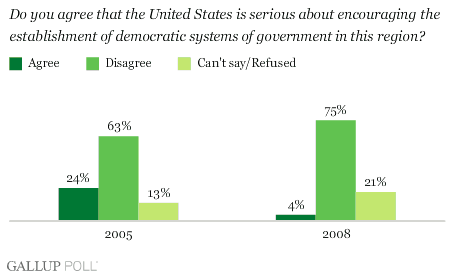
Egyptians' perception that U.S. policy in the region is disingenuous is not unique among citizens in the Middle East and North Africa area. In 2008, ÆéûÜǨû§asked respondents in 34 countries in the region if the United States was serious about establishing democratic systems. Lebanese and Saudis disagree in similar proportions as Egyptians. ÆéûÜǨû§found higher percentages of respondents who disagreed in four other populations, including the Palestinian Territories and Iran.
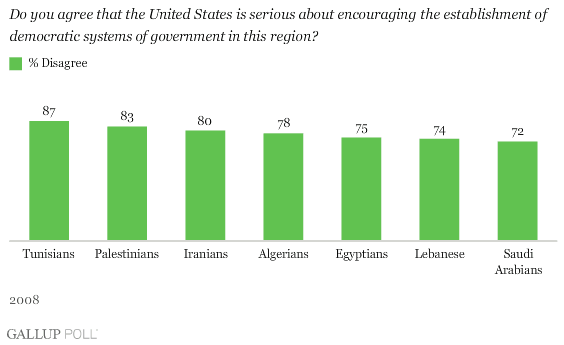
The 20-point decline among Egyptians who agreed, from 24% in 2005 to 4% in 2008, that the United States is serious about promoting democracy is one of the largest among all countries polled. Only in Lebanon did opinion experience a somewhat similar decline (16 points).
Furthermore, between 2005 and 2008, Egyptian opinions about the job performance of the United States' leadership has also grown more negative, most notably from 13% in 2007 to 6% in 2008, which is among the lowest in more than 140 countries ÆéûÜǨû§surveys.
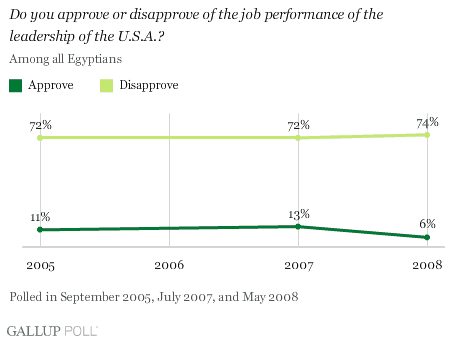
Egyptians' negative attitudes toward the United States persist despite the levels of foreign assistance funding Egypt received from American agencies, including more than $1.3 billion in military aid annually and more than $5 billion in development aid between 2000 and 2008. Since 2004, Congress has also proposed conditioning foreign aid to Egypt based on improving its progress on democratization. One major aim of U.S. development assistance is to promote democratic reform by bettering standards of living. Most recently, this foreign aid has targeted market-based economic development, good governance, and education programs. When asked if the United States is serious about improving the economic lot in this region, Egyptians have consistently disagreed.
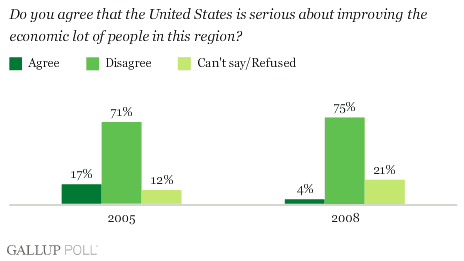
The relationship between U.S. assistance and public approval is not circumstantial. One recent example is Indonesia. In 2004, following the tsunami that hit the Indonesian coast, the United States pledged more than $400 million in recovery and reconstruction. A Pew Research Center poll subsequently reported a spike in Indonesians' approval of the United States, from 15% in 2003 to 38% in 2005. ÆéûÜǨû§began measuring Indonesians' approval of the United States in 2006.
One contributing factor for the findings in Egypt could be that existing U.S. foreign policy regarding the Israel-Palestinian Territories is more allied with Israel than many within Egypt -- likely outweighing the affect of foreign assistance in Egyptians' eyes. According to the Egypt State Information Service, the Egyptian government's support of peace between Israel and the Palestinian Territories, and the establishment of a Palestinian state, differs from the peace conditions the Bush administration promoted.
ÆéûÜǨû§asked Egyptians how much attention they paid to news on the Palestinian Territories. In 2007 and 2008, strong majorities said they paid either some or a great deal of attention to news on the Palestinian Territories.
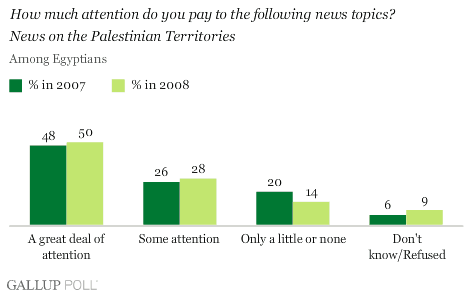
Egyptians' distrust toward the United States is not limited to its efforts to encourage economic growth or democracy in the region. When asked in 2008 if they thought the United States would allow people in the region to fashion their own political future as they see fit without direct U.S. influence, 75% of respondents disagreed and only 4% agreed.
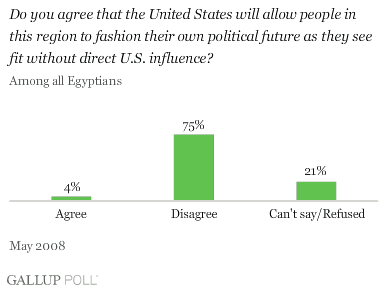
Bottom Line
Despite receiving $2 billion each year in U.S. development assistance, Egyptians' attitudes on various aspects of U.S. foreign policy and leadership have only grown more negative since 2005. Although the United States intends, in part, for the development assistance to help promote democratic reform by improving standards of living, Egyptians remain skeptical that the United States is serious about encouraging democracy or improving the economic lot in their region. One possible driver of these low numbers is the American government's longstanding alliance with Israel. Together, these data suggest that Egyptians views of the United States will likely continue to run in parallel to the future of American policy toward Israel and the Palestinian Territories.
Survey Methods
Results are based on face-to-face interviews with 999 adults, aged 15 and older, conducted between 2005 and 2008. For results based on the total sample of national adults, one can say with 95% confidence that the maximum margin of sampling error is ôÝ3 percentage points. In addition to sampling error, question wording and practical difficulties in conducting surveys can introduce error or bias into the findings of public opinion polls.
